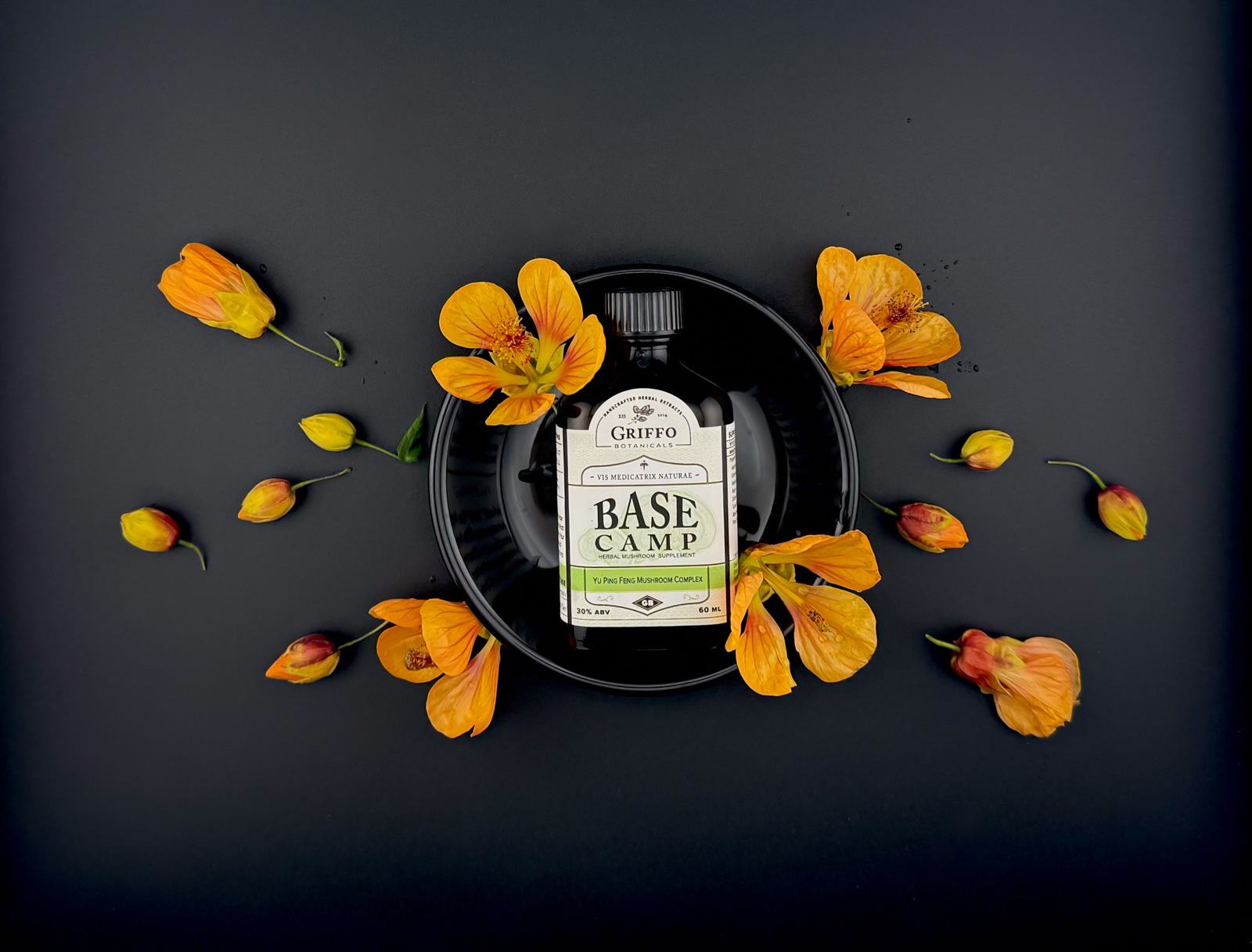Posted by Frank Griffo, L.Ac. on Apr 2nd 2025
Allergies and the Immune System
Spring has arrived! —and with it, allergy season for more than 25% of adults in the United States. While seasonal allergies may seem like a surface-level annoyance, they point to a deeper story about how the immune system perceives and reacts to the world around us. Why does the body react so strongly to harmless substances like pollen or pet dander? And what can we do, not just to relieve symptoms, but to support the immune system at its root?
In this blog, we explore the underlying causes of allergies through the lens of both Western biomedical science and Traditional Chinese Medicine (TCM). We’ll look at how each tradition explains allergic symptoms, what they reveal about the state of the immune system, and how we can approach both prevention and treatment. From histamines to Wei Qi, we'll bridge the gap between these paradigms and offer practical, integrative strategies for supporting patients with allergic presentations.
Introduction to Allergies: Symptoms and Western Pathology
Allergies are exaggerated immune responses to substances that are typically harmless to most people. Common allergens include pollen, dust mites, pet dander, certain foods, and medications. When someone with allergies encounters one of these triggers, the immune system mistakenly identifies it as a threat and initiates a defensive response. This results in symptoms such as sneezing, nasal congestion, itchy or watery eyes, skin rashes, digestive discomfort, or, in severe cases, anaphylaxis.
The immune system plays a critical role in protecting the body from harmful invaders such as bacteria, viruses, and fungi. When it detects such a threat, it produces antibodies—specifically Immunoglobulin E (IgE). These antibodies bind to mast cells, which then release histamines and other chemicals upon future exposures to the allergen. These substances are responsible for the common symptoms associated with allergic reactions, like inflammation, itching, and mucus production. The discomfort experienced during an allergic episode is not caused by the allergen itself but by the body’s overactive immune response to it. For example, inflammation—a common symptom—is the result of the immune system addressing what it perceives as a problem, even when the trigger is harmless.
Environmental factors influence allergy development. Children exposed to dust, air pollution, or cigarette smoke, especially during critical early stages of immune development, have an increased risk of developing allergies. These irritants can heighten immune sensitivity and contribute to chronic allergic patterns.
People didn’t develop allergies like they do today. Nowadays, the world we live in is so much cleaner that we don’t get the same levels of exposure to pathogens, so our immune system doesn’t get a chance to get “primed” and decide what’s good or bad. This is the theory behind the “hygiene hypothesis.” This is the proposed reasoning behind why Type I hypersensitivities are so much more common in the developed world than the undeveloped one. Basically, our life is so clean now that we lack exposure to certain antigens at a young age, preventing our immune system from developing a tolerance to anything.
Ultimately, allergies represent a kind of immune system overdrive—where the body reacts strongly to substances that are not truly harmful. This recognition has led to treatments aimed not at eliminating allergens but at calming and regulating the immune system's response, such as through antihistamines or anti-inflammatory medications.
Traditional Chinese Medicine (TCM) Perspective on Allergies
In Traditional Chinese Medicine (TCM), allergies are typically understood as an insufficiency of the body's defensive energy (Wei Qi). This is the protective energy in the skin and surface of the body. It is supported and fed by the deeper energy within the body called the Ying Qi or nutritive energy. When the Ying qi is deficient and weak it can’t support the Wei Qi. When this happens, external pathogenic influences such as wind, cold, and heat can enter the body and cause colds, flus and allergies. This disharmony between the Ying and the Wei often arises due to underlying deficiencies in the Lung, Spleen, or Kidney systems, which weakens the body's ability to protect itself from external invasions.
Allergic symptoms can have two root causes. One is a manifestation of unresolved or suppressed external pathogens that have not been properly expelled from the body due to weak Ying Qi. For instance, if the body is exposed to a pathogen and the body is too weak to fully expel the disease, then the pathogen may be harbored rather than cleared. This can lead to symptoms that progress along a typical path: fever, stuffy nose, sore throat, coughing, and chest congestion, eventually becoming chronic or recurrent allergies. The other root cause of allergies is external wind invasion. These seasonal allergies are not due to lingering pathogens but due to new exposures to external influences. However, the body is susceptible to these new pathogens because of an underlying weakness.
A Weakened Immune System as a Contributing Factor to Allergies: Dual Perspectives
In both Western medicine and TCM, the concept of immune insufficiency plays a pivotal role in allergic disease. In Western immunology, conditions like selective IgA deficiency are linked to increased susceptibility to allergies. When a dysregulated immune system cannot mount an appropriate response, it may overreact to benign substances, leading to allergic symptoms. A weakened immune system may struggle to distinguish between harmless substances and actual threats, leading to a heightened or prolonged response to allergens. Individuals with weaker immune systems might become more sensitive to allergens, experiencing more frequent or severe allergic reactions. It's important to note that a weakened immune system doesn't cause allergies in the way that a direct exposure to an allergen does. Instead, it can increase the likelihood of developing or experiencing more severe allergic reactions. Primary immunodeficiency (born with a weak immune system) and acquired immune deficiency (due to disease) can increase the risk of allergies and other health problems.
From the TCM perspective, a weakened immune system often stems from internal deficiencies—particularly of Spleen Qi and Lung Qi, which are essential for the production and distribution of Wei Qi. When Wei Qi is weak, the body is less able to defend itself against external influences, allowing allergens (seen as external pathogenic factors) to penetrate and linger within the body.
Both systems also recognize that improper suppression of illness can contribute to long-term immune dysfunction. In Western medicine, overuse of antibiotics can alter gut flora and impair immune balance. In TCM, the incorrect use of cold herbs and drugs can suppress external pathogens, allowing them to become entrenched in the system and manifest later as chronic conditions like allergies.

Treating the Immune System with Griffo’s Basecamp Formula
Basecamp is a foundational formula designed to support and regulate the immune system by tonifying Qi and reinforcing the body’s ability to maintain internal balance. From a Western standpoint, Basecamp can be understood as supporting systemic immune health through adaptogenic and immunomodulating herbs. These help the body achieve a balanced immune response, potentially reducing the hyperreactivity that underlies allergies.
In TCM, Basecamp works to strengthen the Spleen and Lung Qi while supporting Kidney Essence, which together fortify Wei Qi. This is done with the traditional herbs in Yu Ping Feng San: Bai Zhu, Huang Qi, Fang Feng. To this formula we have added a complex of mushrooms known to enhance and regulate immune function, Wu Wei Zi for its ability to strengthen the Wei Qi and lastly, Elderberry, for its tonifying effects on the lung. These herbs aim to boost the ying, spleen, and lung qi to provide a strong support for the Wei Qi. This increased Wei Qi can then defend against the intrusion of allergens and assist in clearing lingering pathogens. By nourishing the body and rebuilding the terrain, Basecamp helps create an internal environment where allergic tendencies are less likely to thrive.

Managing Allergy Symptoms with Griffo’s Allerfree Formula
While Basecamp works on the root of immune imbalance, Allerfree is focused on the branch: the symptomatic relief of allergies. Allerfree combines herbs from Yu Ping Feng San to support the wei qi and large amounts of herbs from Cang Er Zi San to clear wind, drain dampness, and reduce inflammation while also soothing the respiratory tract.
Western herbalists may view Allerfree as an antihistamine-like formulation that modulates inflammatory pathways and stabilizes mast cells, reducing the severity of allergic reactions. In TCM terms, it expels Wind-Cold or Wind-Heat from the Lung, transforms phlegm, and relieves nasal and sinus congestion. It also addresses any lingering pathogens that may be contributing to the allergic reaction.
Using Basecamp and Allerfree together provides a comprehensive strategy:
Basecamp strengthens the body's defenses and treats the root. It is especially useful during the off season to regulate a dysregulated immune system, strengthen the Lung and Spleen.
Allerfree provides fast symptom relief during acute flare-ups while continuing to support the underlying causes.

Conclusion
Allergies reflect a deeper story about the state of the immune system. Whether viewed through the lens of immunoglobulins and cytokines or Wei Qi and lingering pathogens, both medical traditions agree: immune resilience is key. By using comprehensive, multi-layered approaches like Basecamp and Allerfree, practitioners can address both the root and the branches of allergic disease, helping patients experience lasting relief and long-term balance.

Allergies and the Immune System

